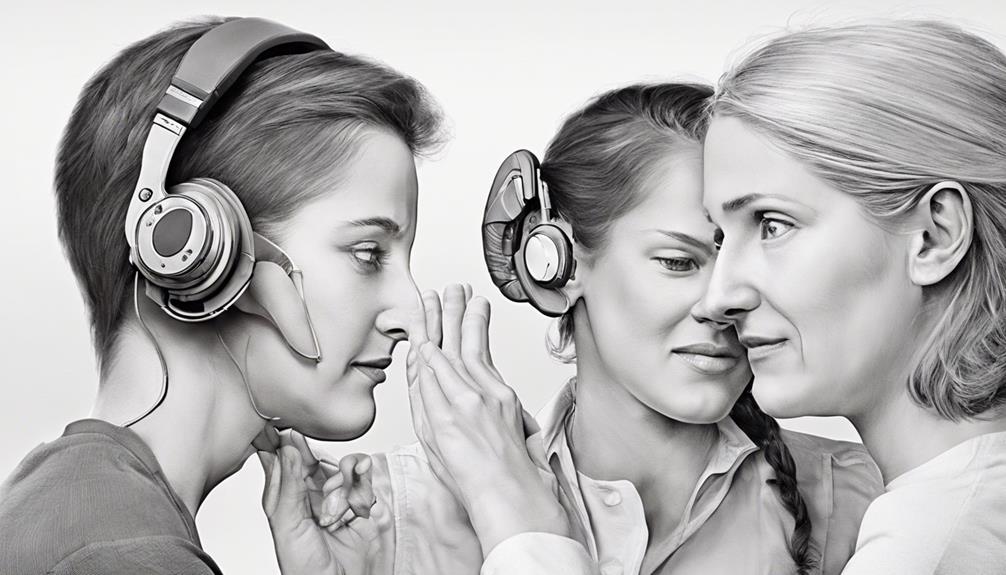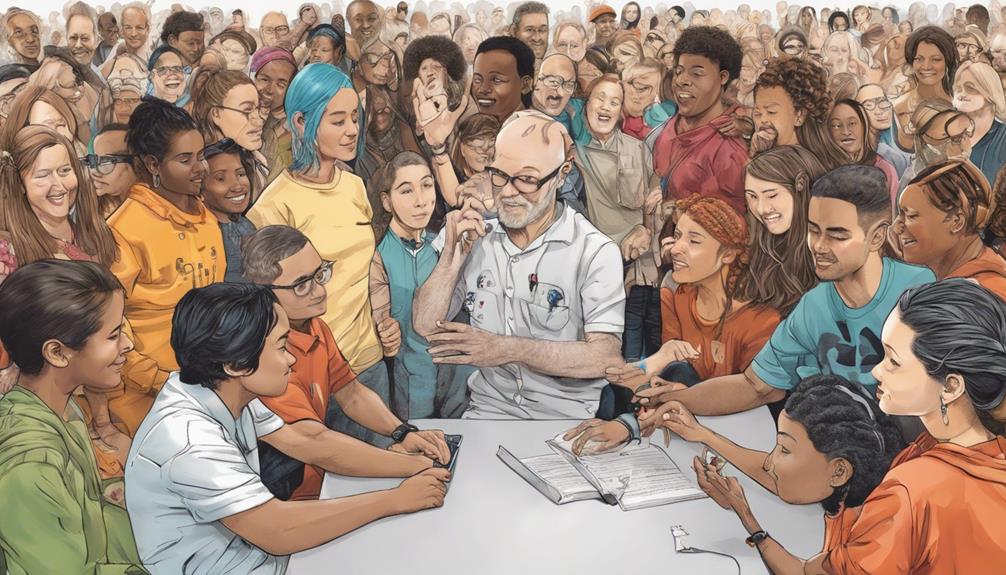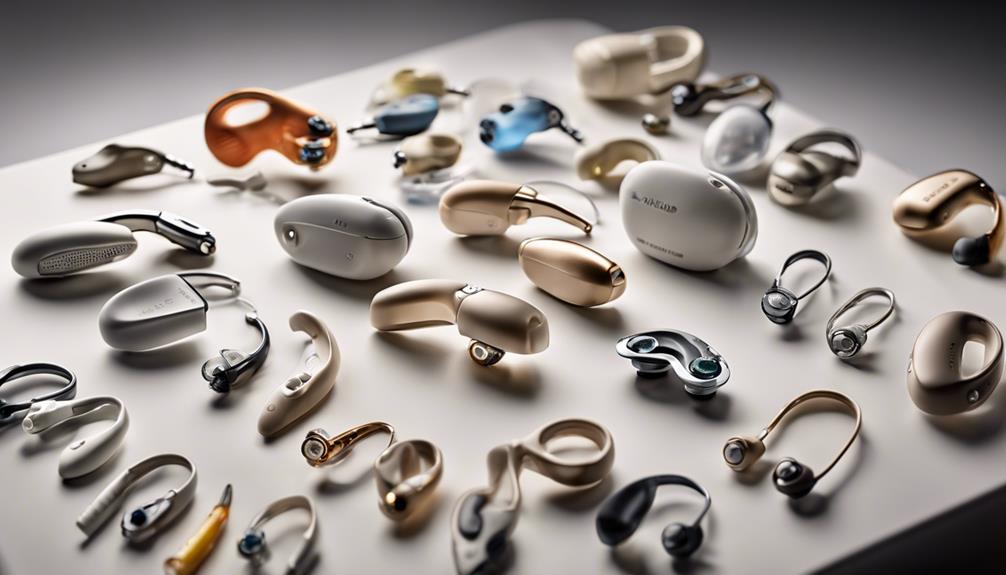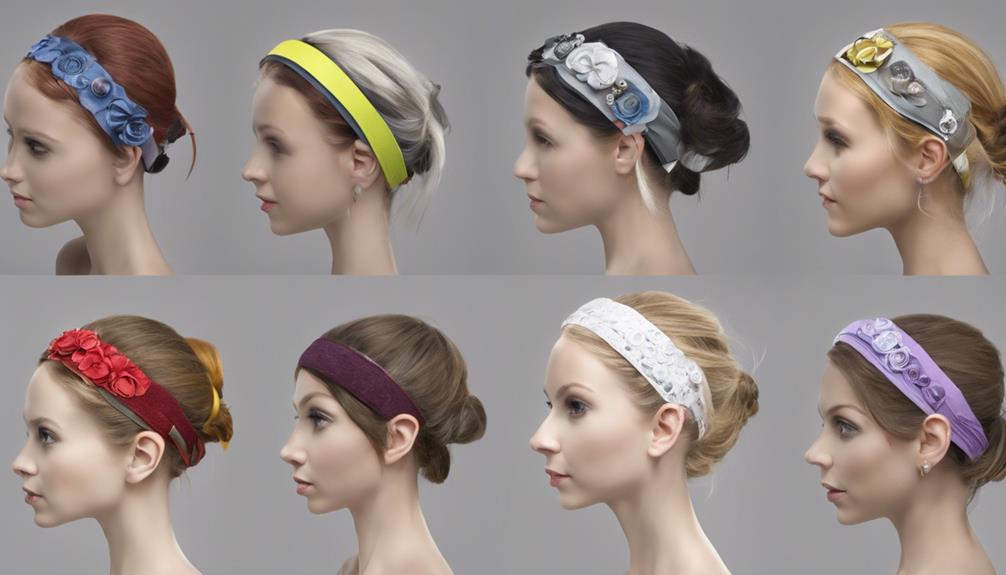While delving into the intricate realm of Deaf culture, cochlear implants emerge as a symbol of both promise and uncertainty.
The decision to embrace or reject this technology reverberates far beyond mere medical intervention, touching upon fundamental aspects of identity, community dynamics, and societal perceptions.
While the allure of enhanced hearing and communication looms large, the shadows of potential consequences and ethical quandaries cast a complex web of considerations.
Join us as we dissect the nuances of this discourse, unraveling the intricate tapestry that binds innovation with tradition in the realm of Deaf culture.
Key Takeaways
- Cochlear implants enhance communication but challenge Deaf cultural identity.
- They offer improved hearing but raise ethical and assimilation concerns.
- Societal perceptions vary, impacting Deaf community inclusion and identity.
- Navigating benefits and challenges requires empathy, respect, and balanced perspectives.
Benefits of Cochlear Implants
Cochlear implants significantly enhance communication and overall quality of life for individuals who are deaf or hard of hearing. These remarkable devices offer a multitude of benefits, including improving hearing ability, reducing social isolation, and minimizing misunderstandings. With cochlear implants, wearers can enjoy a newfound sense of connection to the world around them. The ability to hear various sounds, from the soft whispers of a loved one to the melodies of music, brings immense joy and enrichment to their lives.
One of the most profound advantages of cochlear implants is their role in enhancing communication. By enabling individuals to better understand speech and engage in conversations, these implants bridge the gap that hearing loss can create. Moreover, cochlear implants facilitate a deeper appreciation for music, allowing wearers to experience the beauty of melodies and harmonies.
Challenges in Deaf Culture

Navigating the landscape of Deaf culture presents unique challenges that stem from differing perspectives on communication and identity within the community. Deaf culture places a significant emphasis on sign language as a primary mode of communication, reflecting a rich linguistic heritage and cultural identity.
However, the introduction of cochlear implants has sparked debates within the community. While some view cochlear implants as a tool for assimilation into the hearing world, others see them as a threat to the preservation of sign language and Deaf cultural values. This tension underscores the ongoing struggle to balance the desire for inclusion in mainstream society with the imperative to uphold and advocate for the unique aspects of Deaf culture.
Advocates stress the importance of respecting and preserving sign language as a vital component of Deaf identity and cultural heritage, highlighting the need to navigate these challenges with sensitivity and awareness of the community's diverse viewpoints.
Impact on Cultural Identity
Considering the profound significance of cultural identity within the Deaf community, the impact of cochlear implants raises complex ethical considerations and challenges. Cochlear implants can be viewed as a form of cultural assimilation, potentially posing a threat to the preservation of Deaf cultural identity.
For some individuals in the Deaf culture, the use of cochlear implants is seen as a deviation from the community's values, emphasizing sign language and communal bonds over technological interventions. Ethical dilemmas surface as Deaf culture advocates stress the importance of maintaining cultural identity while also acknowledging the potential benefits of cochlear implants for individuals.
Striking a balance between the advantages of cochlear implants and the respect for Deaf culture requires careful navigation of these intertwined considerations. The tension between embracing new technologies and safeguarding the unique identity of the Deaf community underscores the delicate nature of this debate within the Deaf culture.
Considerations for Deaf Community

Acknowledging the diverse perspectives within the Deaf community regarding cochlear implants, we recognize the importance of considering the varied considerations for individuals and the community as a whole.
When discussing cochlear implants within the Deaf community, several key points must be taken into account:
- Impact on Deaf Cultural Survival: Some individuals within the Deaf community view cochlear implants as a potential threat to the survival of Deaf culture. Gallaudet University, a bastion of Deaf culture, has witnessed protests against cochlear implants due to concerns about their impact on cultural identity and sign language preservation.
- Ethical Issues and Community Debates: The choice of whether hearing parents should opt for cochlear implants for their Deaf children remains a topic of ongoing debate within the community. Balancing the benefits of assistive technology like cochlear implants with the preservation of Deaf cultural values raises complex ethical considerations.
- Evolution of Perspectives: Perspectives on cochlear implants within the Deaf community have evolved over time, showing varying degrees of acceptance and resistance. Understanding these changing attitudes is crucial in fostering empathy and respect within the Deaf community.
Societal Perceptions and Stigma
Societal perceptions towards cochlear implants in Deaf culture exhibit a diverse range of viewpoints regarding assimilation into the hearing world. While some view cochlear implants as a tool for integration and improving communication abilities, others see them as potentially erasing Deaf identity and cultural heritage, thus perpetuating stigma.
Concerns exist that prioritizing speech through cochlear implants could diminish the significance of sign language within the Deaf community, impacting linguistic heritage. The decision to pursue cochlear implants can raise questions about autonomy, identity, and the balance between embracing technological advancements and preserving cultural roots.
Individuals within the Deaf community may face pressure to conform to mainstream hearing norms, sparking debates on cultural preservation and the right to choose how to navigate their Deaf identity in a hearing-centric world. It's crucial to approach these discussions with empathy, recognizing the complexities surrounding societal perceptions and stigma related to cochlear implants within Deaf culture.
Frequently Asked Questions
What Are Pros and Cons of Cochlear Implants?
When considering cochlear implants, it's crucial to weigh the pros and cons. These devices can significantly enhance communication and quality of life for many deaf individuals. They reduce social isolation and misunderstandings by improving the ability to hear a variety of sounds.
While they've mild side effects compared to surgical risks, proper customization by an audiologist is essential for optimal results. Plus, they're often covered by insurance for easier access.
How Do Culturally Deaf People Feel About Cochlear Implants?
We understand that culturally Deaf individuals have varying perspectives on cochlear implants. Some may feel that cochlear implants threaten their identity and sign language use. Others might view them as a way to navigate the hearing world.
Concerns about the impact on Deaf culture and heritage are valid and deserve attention. It's crucial to respect the diverse opinions within the Deaf community and support individuals in making informed choices about their own health and well-being.
What Impact Do Cochlear Implants Have on the Profoundly Deaf?
Cochlear implants have a significant impact on the profoundly deaf, offering access to sound, improved speech perception, and enhanced safety awareness. They can also boost language development and literacy skills.
It's crucial to consider individual preferences and cultural identity within the deaf community. By understanding these benefits and complexities, we can support each person's unique journey towards better communication and social interaction.
What Are the Limitations of a Cochlear Implant?
Limitations of cochlear implants include the inability to fully restore natural hearing, potential risks like infections, and the need for ongoing maintenance. Some users may not benefit as much due to individual differences in how the brain processes sound. It's crucial to manage expectations and understand that cochlear implants may not work for everyone.
Regular follow-up care and therapy are essential for optimizing outcomes and adapting to the device.
Conclusion
In weighing the benefits and challenges of cochlear implants in Deaf culture, we must consider the impact on cultural identity and the nuanced discussions within the community.
How can we navigate the ethical dilemmas surrounding cultural assimilation while preserving the rich heritage of Deaf culture?
It's a complex decision that requires empathy, knowledge, and respect for the diverse perspectives within the Deaf community.










